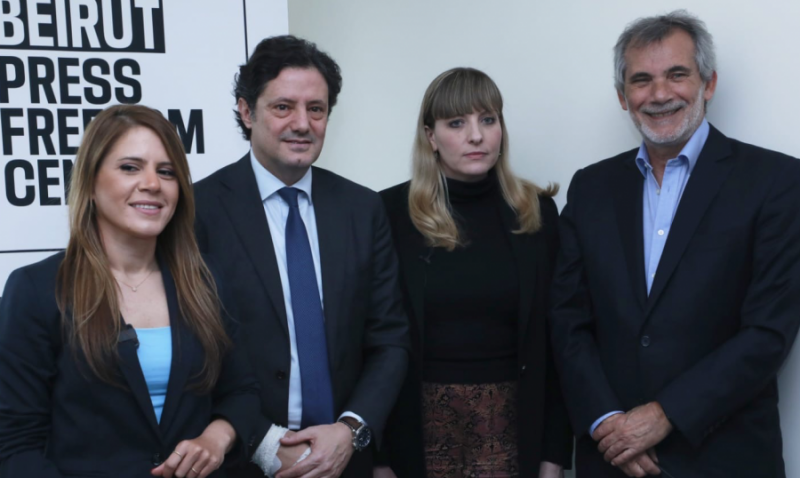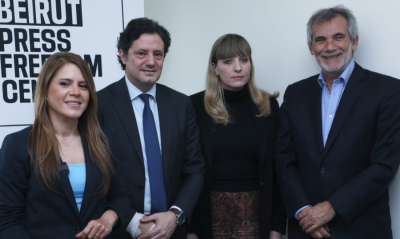The organization "Reporters Without Borders" held a press conference this afternoon to announce the opening of the "Regional Center for Press Freedom" in Beirut, located at the "Twin Towers" – Sami Solh, in the presence of the Minister of Information in the caretaker government, Ziad Al-Makari, the president of the "Samir Kassir Foundation," Malik Murwa, and journalist Carmen Joukhadar from the "Al Jazeera" channel, along with media representatives.
Rebecca Vincent, the campaigns director at "Reporters Without Borders," began by welcoming the attendees and stated: "As we gather in Beirut today, Israeli forces have killed more than 100 journalists in the Gaza Strip in less than six months, among those journalists killed or deliberately targeted while doing their jobs. This makes Gaza the deadliest conflict zone for the media in history, while the war in Gaza has had an undeniable impact on journalism in the region."
She continued: "Today we remember Issam Abdullah, a Reuters journalist who was killed in an Israeli bombing in southern Lebanon on October 13, 2023. The findings of our initial investigation into Issam's death were supported by investigations conducted by Amnesty International, Human Rights Watch, and Agence France-Presse, which found that Israeli tank fire killed Issam and injured six other journalists. This was confirmed by a recent report from the United Nations Interim Force in Lebanon. Yet there has been no accountability for this clear war crime. We were deeply affected yesterday when we met with Christine Asi, whose life has changed due to the serious injuries from this attack, and Dylan Collins was also seriously injured."
She added: "We are very happy that Dylan is in the room with us today, and we will of course listen to Carmen Joukhadar, who was injured in the same attack. We at 'Reporters Without Borders' express our solidarity with these brave journalists and our full support for their fight for justice. We also remember the Lebanese journalists Farah Omar and Rabi' Al-Mahrani, who were martyred on November 21, 2023, due to a missile strike on the town of Tyre. There is clearly an urgent and desperate need to support journalists covering the war in Gaza and other conflicts in the region. Based on our successful experience in Ukraine, where 'Reporters Without Borders' opened two centers for press freedom which are still operational in Kyiv and Lviv, we are today launching the regional center for press freedom in Beirut."
Vincent said: "Through this center, we are creating a vital space for journalists to gather and work, providing them with a range of protective equipment and essential services, such as helmets and bulletproof vests, first aid supplies, psychological support, legal assistance, and training in digital and physical security, especially for those planning to travel to Palestine. In doing so, we seek to make the place as safe as possible for journalists to do their work and report on the war in Gaza and other conflicts in the region."
Then, Malik Murwa, president of the "Samir Kassir Foundation," spoke, starting his remarks by sending "salutations to the spirit of journalist Gisele Khoury, who established the Samir Kassir Foundation. With her far-sighted vision and great energy, she revitalized this foundation. Today, we extend our thousand greetings to her spirit." He thanked "Reporters Without Borders" for their cooperation with the Samir Kassir Foundation in opening this center in partnership with us, emphasizing the importance of this center due to the fact that we live in a state of war and journalists are in a very dire situation, with three martyrs and twelve injuries among journalists in the south, and the massacres against journalists in Gaza being unprecedented in the history of journalism, in addition to the problems faced by journalists in Syria."
He said: "I urge Lebanese journalists, especially since we prepared a study on the journalists and institutions they work for, which showed us that life insurance is non-existent or, if available, is symbolic and does not cover costs. Therefore, I urge journalists to benefit from and use this center. At the Samir Kassir Foundation, we have conducted training sessions for journalists on how to deal with the dangers of war. This serious training lasts five days and simulates the realities of working on the ground and the expected dangers such as explosions, in addition to securing digital protection for their devices."
He concluded: "Thus, I urge Lebanese journalists, given their difficult situation and the equipment they possess, most of which does not meet international standards, to utilize this center. We at the Samir Kassir Foundation stand in solidarity with you and are working on any program that secures your protection and develops your work."
Carmen Joukhadar then spoke about her experience and her serious injury while performing "her media mission in the south on October 13, where Israel targeted seven journalists in the south, and colleague Issam Abdullah became a martyr while I was severely injured. There are several levels we need to talk about; yesterday I returned to coverage, and there are colleagues unaware of the importance of protective equipment, which is essential for their safety. Moreover, most journalists are not trained and do not know their rights."
She added: "I direct a message to media institutions, saying they are responsible for the journalists fulfilling their duties, as we cover violations against Lebanon and against humanity, documenting a period in this country's history. Institutions are responsible for cooperating with the state and organizations for the safety of journalists; there is no safe place in the south or in any war zone. Furthermore, on the judicial and legal level, media institutions must know how to protect journalists' rights and duties."
She ended by thanking "Reporters Without Borders," stressing the "importance of documenting events and bringing them to justice against Israel which has grown accustomed to impunity, but supporting journalists and standing by them to perform their tasks at the highest level. In light of the weak support from media institutions, the most important role remains for international organizations."
Minister Al-Makari then delivered a speech expressing his "pride that this center is opening in Beirut, which will remain a beacon in the Middle East." He also thanked the "Samir Kassir Foundation," noting "the importance of collaboration among journalists," saying: "As an official institution and state television, we sent journalists who underwent training with the Samir Kassir Foundation. Journalists from the National News Agency and Tele Liban conducted several training sessions with the army, civil defense, and the Red Cross."
Regarding the assassination of journalists, he said: "All investigations have shown that the targeting was intentional to kill the truth and deter many journalists from fulfilling their duties to document Israeli assaults."
He added: "As the Ministry of Information and the Lebanese Government, we are not signatories to any treaties related to criminal courts and international courts, but we do what we can through correspondence that enables people like Issam Abdullah's sister to file a complaint. Therefore, I will present in the first session of the Cabinet that the Reuters investigation be a detailed investigation that the Lebanese state adopts, so that Issam's martyr family can file a complaint before criminal and international bodies."
He continued: "Part of the war is media-related, and another part documents what is happening regarding violations related to Lebanon's sovereignty and Resolution 1701. Regarding journalists' safety, we have worked a lot and are cooperating with international bodies, and equipment for journalists will arrive soon. I would like to say that we have communicated with many media institutions that have correspondents in the south to take serious measures for equipment and training under accountability."
He concluded: "Regarding freedom of expression in Lebanon, it advanced 11 points last year, but this progress can regress, although this does not relate to freedom of expression as much as it relates to what is happening in the south. In any case, we are pleased to cooperate with all international organizations that believe in freedom and the safety of journalists."




